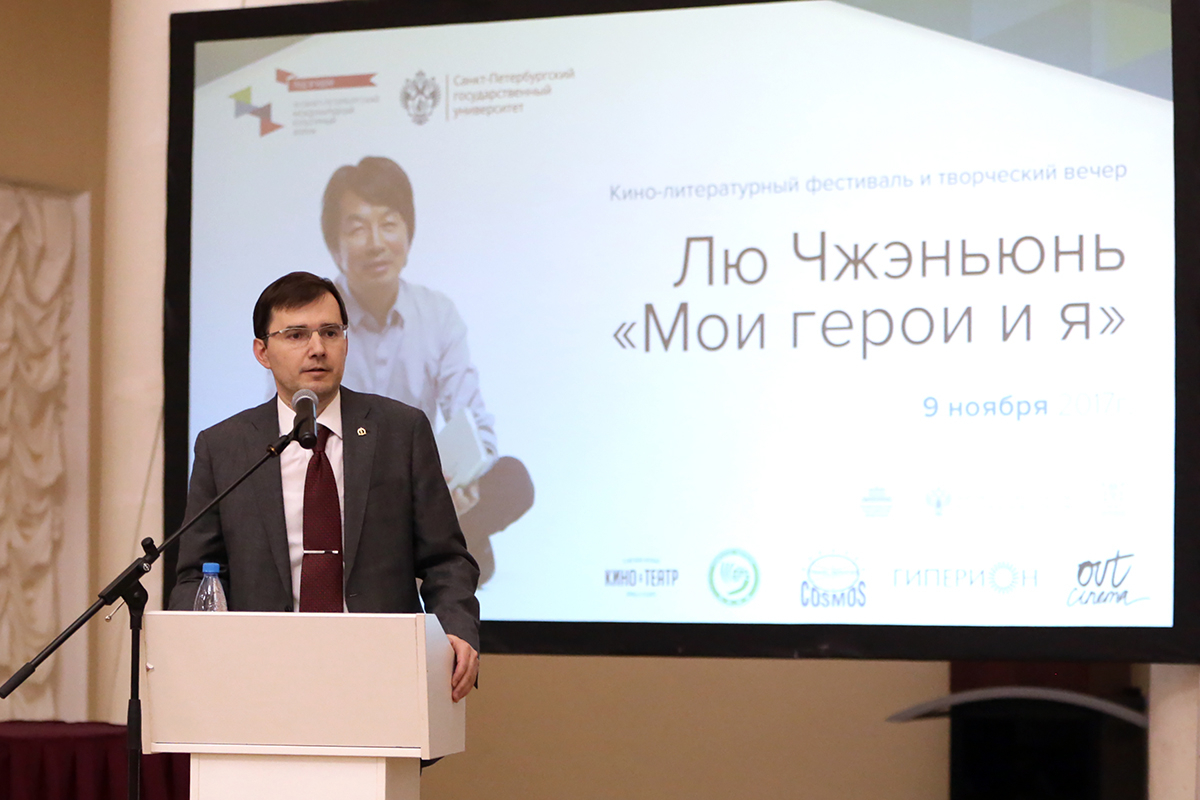Liu Zhenyun: I come to Russia following the steps of my books

St Petersburg University has opened a cinema and literature festival that focuses on the Chinese writer Liu Zhenyun. The first event in the programme is a discussion “My characters and I” where he met SPbU’s students and guests. The event is part of the VI St Petersburg International Cultural Forum.
The event was opened by the SPbU’s Vice-Rector for Research Sergei Aplonov who told that it was a great honour to meet the writer who is universally recognized. “Liu Zhenyun is closely tied up with the University”, — said Sergei Aplonov. The Chinese writer has graduated the Beijing University that is a partner of SPbU and works as Professor in the Renmin University of China that the University has created a centre to study China and Russia with.
The cinema and literature festival is a big event in the Russian culture that focuses on the Chinese writer, said the moderator and the Senior Dean Deputy of the Faculty of Oriental Studies Aleksei Rodionov. This year, SPbU has already had an open lecture by another globally recognized writer, Nobel Prize winner in Literature Orhan Pamuk.
Liu Zhenyun, a well-known writer in China who has won the Mao Dun Literature Prize, is known in Russia thanks to the translations of his novels by SPbU’s professors. His novels published in Russia have been translated by SPbU’s Associate Professor Oksana Rodionova, among them are most celebrated novels: Cell Phone, My Name is Liu Zhenyun, I Am Not Pan Jinlian, and One Word Is Worth Ten Thousand Words.
“I am pleased that Russian readers like my novels. Probably, thanks to the translators of outstanding merit, rather than me, - he joked. — I suppose that sometimes a translator knows more than a writer. A good writer knows one language and one country, while a good translator must know at least two languages and have a deep insight into how the people in these countries live”.
Keeping in touch with those who are concerned with the Chinese studies abroad is vital for any Chinese writer: the characters, plot, thoughts are transmitted through a translator, said Liu Zhenyun. “I have come to Russia following the steps of my books: first you got to know them and then me, — said Liu Zhenyun. — This is how you can meet an author in a natural way”. Moreover, he confessed that when he meets his readers, he can gain another perspective to his novels and discover something that has been hidden from him.
Liu Zhenyun is difficult to translate, although his texts may appear simple at first glance, said Oksana Rodionova. Mostly it is the grammatical structures, names of the precedent characters, metaphors, proverbs, and stylistics of the original that are difficult to translate. How he unfolds the story resembles the Chinese tales that the Russian readers know little about, and various allusions to the traditional Chinese literature have to be accompanied by the editor’s comments. It makes his prose nation-specific. Besides, he is exceptionally good at depicting the everyday life. Some of his novels, for example, One Word Is Worth Ten Thousand Words, is a true encyclopedia of the traditions and customs in China, said the translator, as he is so specific about the details, being generous with the actual statistics, and fond of colourful and vivid scenes. The atmosphere of his novels is well preserved in the films. The film versions of his several novels are created by his daughter Liu Yulin who is a bright director from the new generation of the Chinese directors.
Seemingly simple language hides our deep feelings, and it makes Liu Zhenyun humanist.
Oksana Rodionova, a translator of Liu Zhenyun’s novels
“He understands his characters as they are, — said Oksana Rodionova. — His novels tell that we are drops of the ocean, everything in our life is closely connected and interrelated, there are no people who we don’t need”. Today a writer must show the world what people who we forget about and don’t listen to or hear feel and think, said Liu Zhenyun.
The composition of Liu Zhenyun's novels is non-standard, said the SPbU’s graduate, expert in Oriental Studies, and science fiction writer Viacheslav Rybakov. Most novels tell about our life in a quite humorous way. Still, how the book ends lets us look at the history of the whole country. It is the end of the novel that makes the narrative a reflection of the author on the life of the Chinese people, with no moral preaching anyway. “His books show us how to live simply, with love and sympathy to people. I want contemporary Russian literature to have the same attitude to its past and present”, — said Viacheslav Rybakov.
At the end of the event, the guests could ask him any questions. They were interested in why he approached loneliness in a humorous manner, how he could talk simply about difficult things. “It is a dialectics between the structure and meaning of a novel, literature, and our life”, — said Liu Zhenyun. The ironic attitude to life that the Chinese people have is deeply rooted in the difficulties the country has faced throughout its history, said Liu Zhenyun. Simple and concise language is the key to the philosophical and social problems, while humour is a way how you can perceive and accept them.

